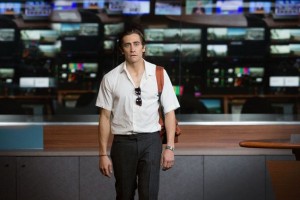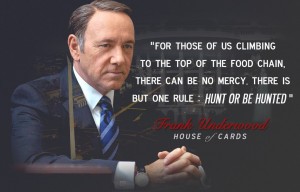 For the past couple of weeks, I’ve found myself watching, analysing, and comparing some rather strange fictional characters. From Lou Bloom, the main character in Nightcrawler, to Christian Grey, to Frank Underwood, these guys are all similar – all trying to get things done while facing constant, intense pressure, and neverending setbacks.
For the past couple of weeks, I’ve found myself watching, analysing, and comparing some rather strange fictional characters. From Lou Bloom, the main character in Nightcrawler, to Christian Grey, to Frank Underwood, these guys are all similar – all trying to get things done while facing constant, intense pressure, and neverending setbacks.
Whenever a season of House of Cards comes out, it tends to get binged almost immediately, and this was certainly the case this time around. Frank Underwood has had the toughest time yet, this time in the big chair. No spoilers, don’t worry.. Nightcrawler was an unexpected, but highly captivating movie, about an individual who starts at the bottom, and makes it to the top, with little regard for obstacles in the way. And Christian Gray – well I obviously ignored the books, and wasn’t expecting the movie to be any good, but I have to admit, I did not get bored during those two hours in the cinema. And he has a grey Audi and a black Tesla, so he’s doing something right..
What was disconcerting, however, was how, in the slightest of ways, I could feel myself relating to these people. Not to their actions. And not to the ridiculous “personal interests” of Christian Grey. But to the fact that these three people had one thing in common. They knew exactly what they wanted. Their life was focused around getting it. And it wasn’t easy for them.
 Sure, Christian Grey was a billionaire by the age of 27. But he wants Anastasia Steele. And Lou Bloom wants to be the most successful person in news video production. And Frank Underwood – well we all know what Frank wants. These movies and tv shows portray highly successful, driven, but broken men in their pursuit of a singular goal that they refuse to give up on. And the scariest thing about it, is how easy it is to relate to them.
Sure, Christian Grey was a billionaire by the age of 27. But he wants Anastasia Steele. And Lou Bloom wants to be the most successful person in news video production. And Frank Underwood – well we all know what Frank wants. These movies and tv shows portray highly successful, driven, but broken men in their pursuit of a singular goal that they refuse to give up on. And the scariest thing about it, is how easy it is to relate to them.
They just want to get things done, right? The people who are loyal to them, they treat extremely well, and are loyal to just as much. But those who aren’t, well let’s just say things don’t work out for those people. Lou wanted to help his cameraman – gave him constant ongoing feedback (I have to say Lou was probably the best manager I have ever seen) and gave him the opportunity for a raise. But then that same cameraman blackmailed him. And that didn’t end well at all.
All people can be placed on an axis of ambition. Some people just want an easy and happy life. Others want to run the world. And everyone else is somewhere in the middle. Wherever you fall on that spectrum, you inevitably gravitate towards people who are somewhere nearby. If you’re at the lower end, then your social life consists of having a few beers and chatting about cars and football. If you’re at the top end, then you hope to find some people who aren’t in direct competition with you, so that you can share and connect over the emotional pressures of the intrinsic drive that you both have.
 And it’s if you’re at the top of that axis, that you start wondering whether these characters, Lou, Christian and Frank, are heroes, rather than villains. You start considering whether, if you stripped back the cinematographic hyperbole necessary to attract viewers – from the sex to the violence – and placed yourself in their shoes, whether you would in fact end up the same.
And it’s if you’re at the top of that axis, that you start wondering whether these characters, Lou, Christian and Frank, are heroes, rather than villains. You start considering whether, if you stripped back the cinematographic hyperbole necessary to attract viewers – from the sex to the violence – and placed yourself in their shoes, whether you would in fact end up the same.
The danger with being ambitious, is that the focus becomes growth, at any cost. Our time in this world is limited. There are only so many years to get to where we need to get to. So what can be done in one cannot be allowed to take two. And this is only further compounded if you’re in technology, or VC-backed, because then all day every day, your only priority is growth. The only thing you think, strategise, or plan for, is how to get further, quicker. But that’s exactly how you end up like Frank Underwood. And that’s a scary thought.
Because while these characters have immense, commanding charisma, an immutable ability to spontaneously produce a logical argument in response to an unexpected situation (how good are Frank Underwood’s responses during all of the press sessions), and a truly relentless drive, they are also entirely unacceptable human beings. During fleeting, individual, moments, it’s possible to respect them. There are things they are truly exceptional at, that we may want to emulate. But they are not good people. And they are not happy. And things to not end well for them.
 When we choose to start a business, or pursue a career, or do anything which puts us at the top of that axis of ambition, we inadvertently put ourselves under pressure that pushes us in the direction of being Frank Underwood. And that’s something that needs to be realised, and internalised. It’s something that cannot be allowed to remain subconscious. We need to deliberately and invariably maintain our strength of character. When we face a difficult choice, we need to remind ourselves to pick the one that is right. Not the one that serves us best. Because if we pick the one that optimises for success, and we do that too many times, we will become Frank Underwood. And in the cold light of day, we’ll realise that that’s just not as great as we thought it would be.
When we choose to start a business, or pursue a career, or do anything which puts us at the top of that axis of ambition, we inadvertently put ourselves under pressure that pushes us in the direction of being Frank Underwood. And that’s something that needs to be realised, and internalised. It’s something that cannot be allowed to remain subconscious. We need to deliberately and invariably maintain our strength of character. When we face a difficult choice, we need to remind ourselves to pick the one that is right. Not the one that serves us best. Because if we pick the one that optimises for success, and we do that too many times, we will become Frank Underwood. And in the cold light of day, we’ll realise that that’s just not as great as we thought it would be.
Find out more on the about Ivan Mazour page.
And watch Ivan Mazour's TEDx Talk - "Why we shouldn't be scared of sharing our personal data".

2 comments
Ivan,
I stumbled across your LinkedIn page after reading a job-description for Ometria that popped up on my feed.
I really enjoyed reading this article and I must commend you on your ability to juggle so many things at once. I haven’t seen Fifty Shades, nor am I an avid House of Cards fan, but I was enthralled by Jake Gyllenhaal’s performance in Nightcrawler.
It’s nice to read that you are a firm believer in the strength of one’s character. That is something we have in common.
Kevin
Thanks for reading Kevin – definitely check out House of Cards, the performance is as strong as the Nightcrawler one.